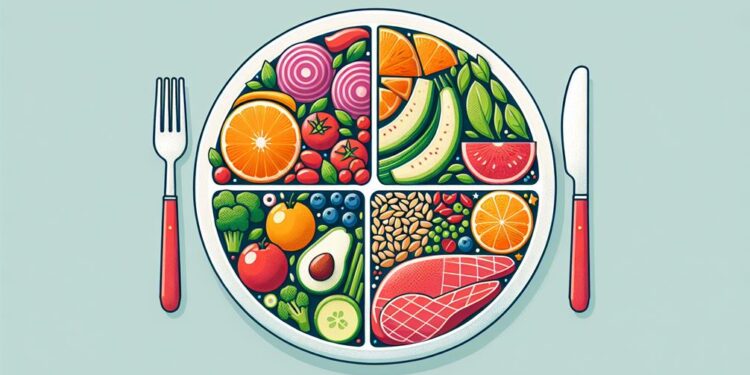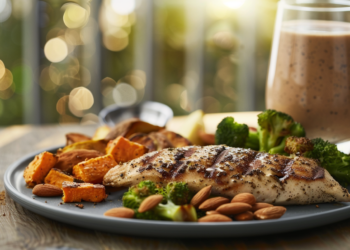Did you know that approximately 45 million Americans go on a diet each year? With so many people striving to lose weight, it's crucial to find nutrition tips that are effective and sustainable in the long run. If you're looking for strategies to help you achieve your weight loss goals while maintaining a healthy lifestyle, this discussion will provide you with practical advice and expert guidance. From setting achievable goals to incorporating mindful eating practices, we'll explore key strategies that can lead to sustainable success. So, if you're ready to take control of your health and make lasting changes, let's dive into these nutrition tips for weight loss.
Key Takeaways
- Set specific and measurable goals for weight loss success.
- Prioritize nutrient-dense foods for sustainable weight loss and overall health.
- Practice mindful eating to be aware of food choices and prevent overeating.
- Incorporate regular physical activity for weight loss and overall well-being.
Set Achievable Goals
When it comes to weight loss, setting achievable goals is crucial for success. Goal tracking and staying motivated are key components of a successful weight loss journey. By setting specific and measurable goals, you can track your progress and stay motivated along the way.
One effective strategy is to set short-term goals that are attainable within a realistic timeframe. For example, instead of aiming to lose 20 pounds in a month, set a goal of losing 1-2 pounds per week. This approach allows you to celebrate small victories and maintain your motivation as you work towards your ultimate weight loss goal.
Goal tracking is essential for keeping yourself accountable. Use a journal or a weight loss app to record your goals, track your food intake, and monitor your exercise routine. Regularly reviewing your progress will help you identify any areas that need improvement and allow you to make necessary adjustments to stay on track.
To stay motivated, it's important to find activities that you enjoy and that fit into your lifestyle. Whether it's going for a walk, trying a new workout class, or cooking healthy meals, find activities that make you feel good and keep you engaged in your weight loss journey.
Prioritize Nutrient-Dense Foods
To improve your weight loss journey, it is important to prioritize nutrient-dense foods in your diet. Nutrition guidelines suggest that focusing on nutrient-dense foods can help you achieve sustainable weight loss and maintain overall health. These foods are rich in essential nutrients, such as vitamins, minerals, and antioxidants, while being relatively low in calories. They provide your body with the necessary fuel and support for optimal functioning.
When planning your meals, it is helpful to include a variety of nutrient-dense foods from different food groups. This ensures that you are getting a wide range of essential nutrients. To give you an idea of some nutrient-dense foods, here is a table with examples:
| Food Group | Nutrient-Dense Foods |
|---|---|
| Fruits | Berries, citrus fruits, apples |
| Vegetables | Leafy greens, broccoli, peppers |
| Protein | Fish, chicken breast, tofu |
| Whole Grains | Quinoa, brown rice, oats |
| Dairy | Greek yogurt, cottage cheese |
| Healthy Fats | Avocado, nuts, olive oil |
Incorporating these nutrient-dense foods into your meals can help you feel satisfied and nourished while supporting your weight loss goals. Remember to choose the foods that you enjoy and that fit your dietary preferences. By prioritizing nutrient-dense foods, you can create a balanced and healthy eating plan for sustainable weight loss.
Practice Mindful Eating

Practicing mindful eating can enhance your weight loss journey by promoting a greater awareness of your food choices and eating habits. Mindful eating techniques involve paying full attention to the present moment and being conscious of your eating experience. By slowing down while eating, you can savor the flavors, textures, and aromas of your food, leading to a more satisfying and enjoyable meal.
One of the key benefits of slowing down while eating is that it allows your body to register feelings of fullness more accurately. When you eat quickly, it takes time for your brain to receive the signal that you are full, often leading to overeating. By taking your time and chewing slowly, you give your brain a chance to catch up with your stomach, preventing excessive calorie intake.
In addition, slowing down while eating can also help improve digestion. When you eat quickly, you may not chew your food thoroughly, which can put a strain on your digestive system. By taking smaller bites and chewing slowly, you give your body the time it needs to break down the food properly, aiding digestion and nutrient absorption.
Practicing mindful eating also encourages you to listen to your body's hunger and fullness cues. By paying attention to your body's signals, you can better understand when you are truly hungry and when you have had enough. This can help prevent mindless snacking and unnecessary calorie consumption.
Incorporate Regular Physical Activity
Regular physical activity is an essential component of a successful weight loss journey, offering numerous benefits to both your physical and mental well-being. Incorporating regular exercise into your routine not only helps you shed excess pounds, but also improves your overall fitness and boosts your mood. Here are some physical activity benefits and fitness routine suggestions to help you on your weight loss journey:
- Physical activity benefits:
- Burns calories: Engaging in regular exercise helps you burn calories, contributing to weight loss.
- Increases metabolism: Regular physical activity can increase your metabolic rate, making it easier to maintain a healthy weight.
- Improves cardiovascular health: Exercise strengthens your heart and improves blood circulation, reducing the risk of heart disease and other cardiovascular conditions.
- Fitness routine suggestions:
- Aerobic exercises: Activities such as running, cycling, swimming, or brisk walking can help you burn calories and improve cardiovascular fitness.
- Strength training: Incorporating strength training exercises like weightlifting or bodyweight exercises helps build muscle mass, which can increase metabolism and aid in weight loss.
- Flexibility exercises: Including activities like yoga or stretching can improve flexibility, balance, and posture, enhancing overall fitness.
Seek Professional Guidance

For personalized and expert guidance on your weight loss journey, it is recommended to seek the assistance of a qualified professional. While there is a wealth of information available online and in books, navigating through it all can be overwhelming and confusing. A professional consultation can provide you with personalized recommendations tailored specifically to your unique needs and goals.
When seeking professional guidance, it is important to find a qualified expert in the field of nutrition and weight loss. This could be a registered dietitian, a nutritionist, or a healthcare professional with specialized knowledge in weight management. These professionals have undergone extensive education and training, ensuring that they can provide evidence-based recommendations that are grounded in scientific research.
During a professional consultation, the expert will take into account various factors such as your current health status, any existing medical conditions, dietary preferences, and lifestyle habits. They will analyze your dietary intake, assess your nutritional needs, and develop a personalized plan that aligns with your goals. This plan may include specific dietary recommendations, portion control guidelines, meal planning strategies, and behavior modification techniques.
In addition to providing personalized recommendations, a professional can also offer ongoing support and accountability. They can help you track your progress, make adjustments to your plan as needed, and provide motivation and encouragement along the way. This level of guidance and support can significantly increase your chances of long-term success in achieving your weight loss goals.
Frequently Asked Questions
How Can I Set Achievable Weight Loss Goals That Are Realistic and Sustainable?
You can set achievable weight loss goals that are realistic and sustainable by incorporating strategies like portion control, regular exercise, and mindful eating. These approaches can help you create long-term habits for successful weight loss.
What Are Some Examples of Nutrient-Dense Foods That I Should Prioritize in My Weight Loss Journey?
When it comes to your weight loss journey, focusing on nutrient-dense foods is key. These foods, like leafy greens, lean proteins, and whole grains, not only help you shed pounds but also provide important vitamins and minerals for overall health.
How Can I Practice Mindful Eating to Avoid Overeating and Make Healthier Food Choices?
To practice mindful eating and make healthier food choices, try techniques like slowing down, paying attention to hunger and fullness cues, and savoring each bite. This can help prevent overeating and promote sustainable weight loss.
What Are Some Effective Ways to Incorporate Regular Physical Activity Into My Daily Routine for Weight Loss?
To incorporate regular physical activity into your daily routine for weight loss, try taking the stairs instead of the elevator, walking or biking to work, or scheduling in exercise breaks throughout the day. Regular exercise has numerous benefits for weight loss and overall health.
When Should I Consider Seeking Professional Guidance for My Weight Loss Journey and What Are the Benefits of Doing So?
Consider seeking professional guidance for your weight loss journey when you need personalized support and expert advice. The benefits include a tailored approach to your specific needs, accountability, and access to evidence-based strategies for sustainable success.
Conclusion
In conclusion, by setting achievable goals, prioritizing nutrient-dense foods, practicing mindful eating, incorporating regular physical activity, and seeking professional guidance, you can embark on a sustainable weight loss journey. Imagine the feeling of being in control of your health and well-being, as you make informed choices that nourish your body and mind. Remember, this evidence-based approach will not only help you shed pounds but also promote a healthier and happier lifestyle. Start your journey now and embrace the transformative power of nutrition.













